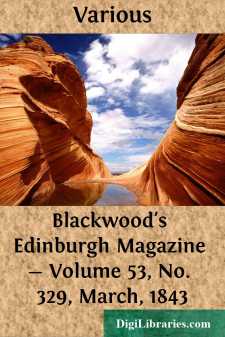Categories
- Antiques & Collectibles 13
- Architecture 36
- Art 48
- Bibles 22
- Biography & Autobiography 813
- Body, Mind & Spirit 142
- Business & Economics 28
- Children's Books 15
- Children's Fiction 12
- Computers 4
- Cooking 94
- Crafts & Hobbies 4
- Drama 346
- Education 46
- Family & Relationships 57
- Fiction 11828
- Games 19
- Gardening 17
- Health & Fitness 34
- History 1377
- House & Home 1
- Humor 147
- Juvenile Fiction 1873
- Juvenile Nonfiction 202
- Language Arts & Disciplines 88
- Law 16
- Literary Collections 686
- Literary Criticism 179
- Mathematics 13
- Medical 41
- Music 40
- Nature 179
- Non-Classifiable 1768
- Performing Arts 7
- Periodicals 1453
- Philosophy 64
- Photography 2
- Poetry 896
- Political Science 203
- Psychology 42
- Reference 154
- Religion 513
- Science 126
- Self-Help 84
- Social Science 81
- Sports & Recreation 34
- Study Aids 3
- Technology & Engineering 59
- Transportation 23
- Travel 463
- True Crime 29
Blackwood's Edinburgh Magazine - Volume 53, No. 329, March, 1843
by: Various
Description:
Excerpt
CHAPTER I.
"Be slow to offend—swift to revenge!"
Inscription on a dagger of Daghestán.
It was Djoumá. Not far from Bouináki, a considerable village of Northern Daghestán, the young Tartars were assembled for their national exercise called "djigÐÑtering;" that is, the horse-race accompanied by various trials of boldness and strength. Bouináki is situated upon two ledges of the precipitous rocks of the mountain: on the left of the road leading from Derbend to Tarki, rises, soaring above the town, the crest of Caucasus, feathered with wood; on the right, the shore, sinking imperceptibly, spreads itself out into meadows, on which the Caspian Sea pours its eternal murmur, like the voice of human multitudes.
A vernal day was fading into evening, and all the inhabitants, attracted rather by the coolness of the breeze than by any feeling of curiosity, had quitted their sáklas, and assembled in crowds on both sides of the road. The women, without veils, and with coloured kerchiefs rolled like turbans round their heads, clad in the long chemise, confined by the short arkhaloúkh, and wide toumáns, sat in rows, while strings of children sported before them. The men, assembled in little groups, stood, or rested on their knees; others, in twos or threes, walked slowly round, smoking tobacco in little wooden pipes: a cheerful buzz arose, and ever and anon resounded the clattering of hoofs, and the cry "katch, katch!" (make way!) from the horsemen preparing for the race.
Nature, in Daghestán, is most lovely in the month of May. Millions of roses poured their blushes over the crags; their odour was streaming in the air; the nightingale was not silent in the green twilight of the wood, almond-trees, all silvered with their flowers, arose like the cupolas of a pagoda, and resembled, with their lofty branches twined with leaves, the minarets of some Mussulman mosque. Broad-breasted oaks, like sturdy old warriors, rose here and there, while poplars and chenart-trees, assembled in groups and surrounded by underwood, looked like children ready to wander away to the mountains, to escape the summer heats. Sportive flocks of sheep—their fleeces speckled with rose-colour; buffaloes wallowing in the mud of the fountains, or for hours together lazily butting each other with their horns; here and there on the mountains noble steeds, which moved (their manes floating on the breeze) with a haughty trot along the hills—such is the frame that encloses the picture of every Mussulman village. On this Djoumá, the neighbourhood of Bouináki was more than usually animated. The sun poured his floods of gold on the dark walls of the flat-roofed sáklas, clothing them with fantastic shadows, and adding beauty to their forms. In the distance, crawling along the mountain, the creaking arbas flitted among the grave-stones of a little burial-ground ... past them, before them, flew a horseman, raising the dust along the road ... the mountain crest and the boundless sea gave grandeur to this picture, and all nature breathed a glow of life....












